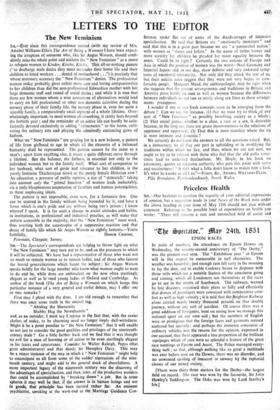SIR,—The Spectator's correspondents are helping to throw light on what
"the New Feminism" may turn out to be, and on the pressures to which it will be subjected. We have had a representative of those who want not so much to remain women as to remain ladies, and of those who lament the horrid generalisations which haunt the subject ; Sir Angus Watson speaks boldly for the large number who know what women ought to want to do and be, while dons are ambivalent on the now often startlingly elegant as well as termed young ladies of Oxford and Cambridge. As author of the book (The Art of Being a Woman) on which hangs this particular instance of a very general and useful debate, may I offer one or two remarks ?
First may I plead with the dons. I am old enough to remember that there was once some truth in the uncivil tag, " Abishag the Shunamite Shabby Hag the Newnhamite"
and, as an outsider, I must say I rejoice in the fact that, with the easier clothes of today, to be charming need no longer imply dull-wittedness. Might it be a point peculiar to "the New Feminism" that it will enable us not just to consider the good qualities and privileges of the nineteenth- century male ? Go a little further back and we find that it was thought no evil for a man of learning or of action to be even startlingly elegant in his tastes and appearance. Consider Sir Walter Raleigh, Pepys (that great administrator) and that dandy Sir Humphry Davy. This may be a minor instance of the way in which a "New Feminism" might help to emancipate us all from some of the sadder repressions of the nine- teenth century, and might add to the general stock of cheerfulness. A more important legacy of the nineteenth century was the discovery of the advantages of specialisation, and then, later, of the productive wonders that could be accomplished by "breaking down" a job. But in some spheres it may well be that, if the answer is in human beings and not in goods, that principle has been carried rather far. An eminent Psychiatrist, speaking at the week-end at the Marriage Guidance Con- ference, spoke flat out of some of the disadvantages of intensive specialisation. He said that Britons are "emotionally immature" and said that this is in a great part because we are "a patriarchal nation.", with women as "slaves and helots." In the name of better homes and, more security for children he pleaded for more equality between the sexes. Could he be right ? Certainly the two nations of Europe and Asia in which the position of women was the worst—Nazi Germany and Imperial Japan—did, in our day, show definite and very awkward symp- toms of emotional immaturity. Not only did they attack the rest of us, but their suicide rates suggest that they were not very happy or com- fortable people. Margaret Mead, the anthropologist. may be right when she suggests that the present arrangements and traditions in Britain and America press hardly on men as well as women because the differences between individuals do not run as neatly along sex lines as these arrange- ments presuppose.
I wonder if one or two fresh concepts seem to be emerging from the debate ? Can we say, for instance, (I) that we must try to thinkiof any sort of "New Feminism" as possibly benefiting society as a whole ; (2) That social justice, whether to a class, a race or a sex, is desirable because, in the long run, there are grave inconveniences in the relations of oppressor and oppressed ; (3) That this is most manifest where the tie is most intimate and domestic ?
We certainly do not know the answers to all the questions raised. But, in a democracy, we all play our part in upholding or in modifying the traditions within which we live, and thus, where we are not sure, we ought to try to be tolerant with those who feel that the old paths some- times lead to undesired destinations. Mr. Hoyle, in his book on astronomy, quotes an unknown authority who puts this point with verve and succinctness: "It ain't what a fella don't know as makes him a fook It's what he knows as ain't so."—Yours, &c., AMMILL WILLIAMS-ELLIS. .
Phis Brondanw, Peurhyndeudraeth, North Wales.


































 Previous page
Previous page